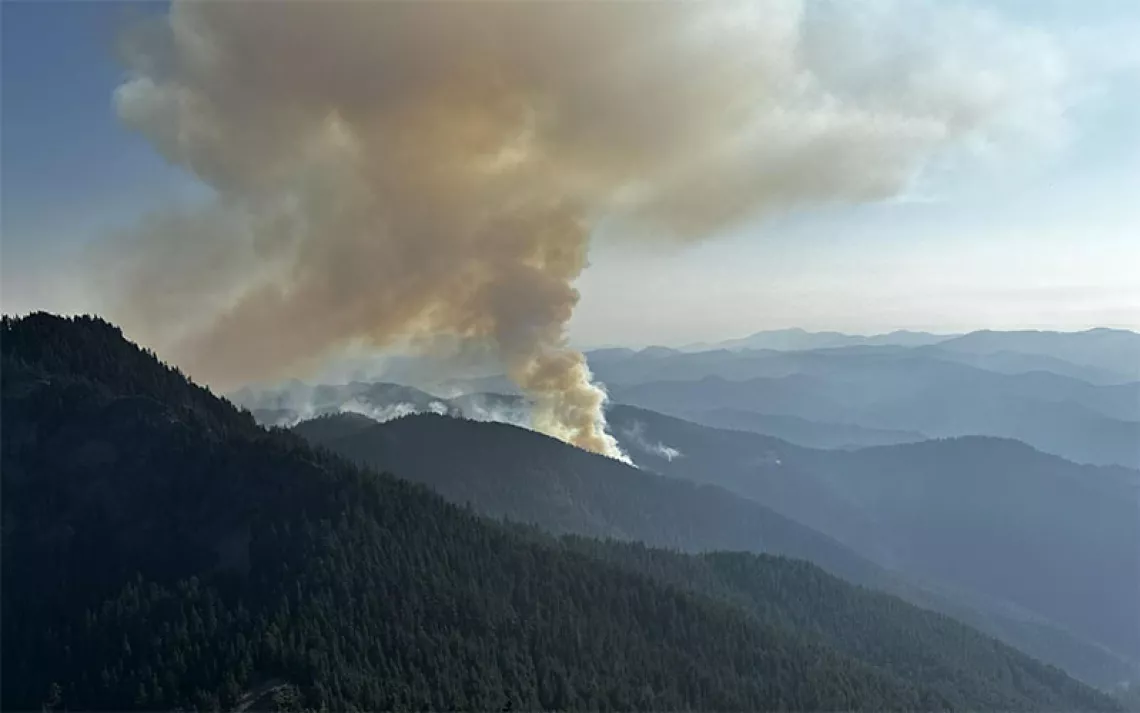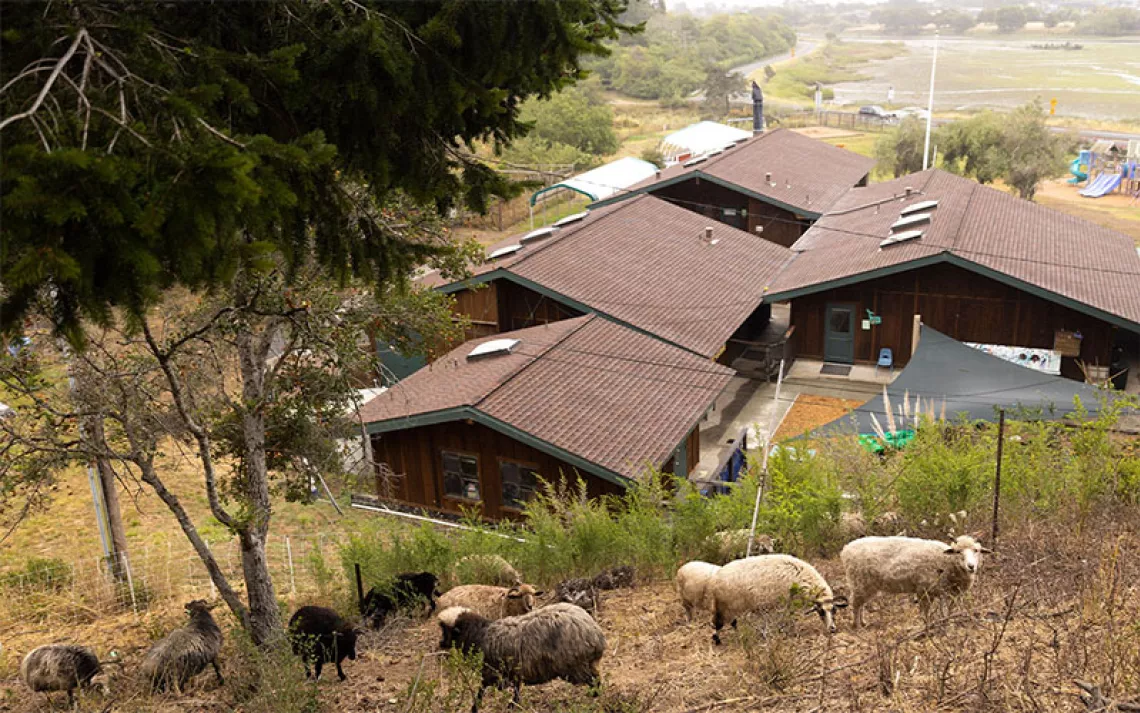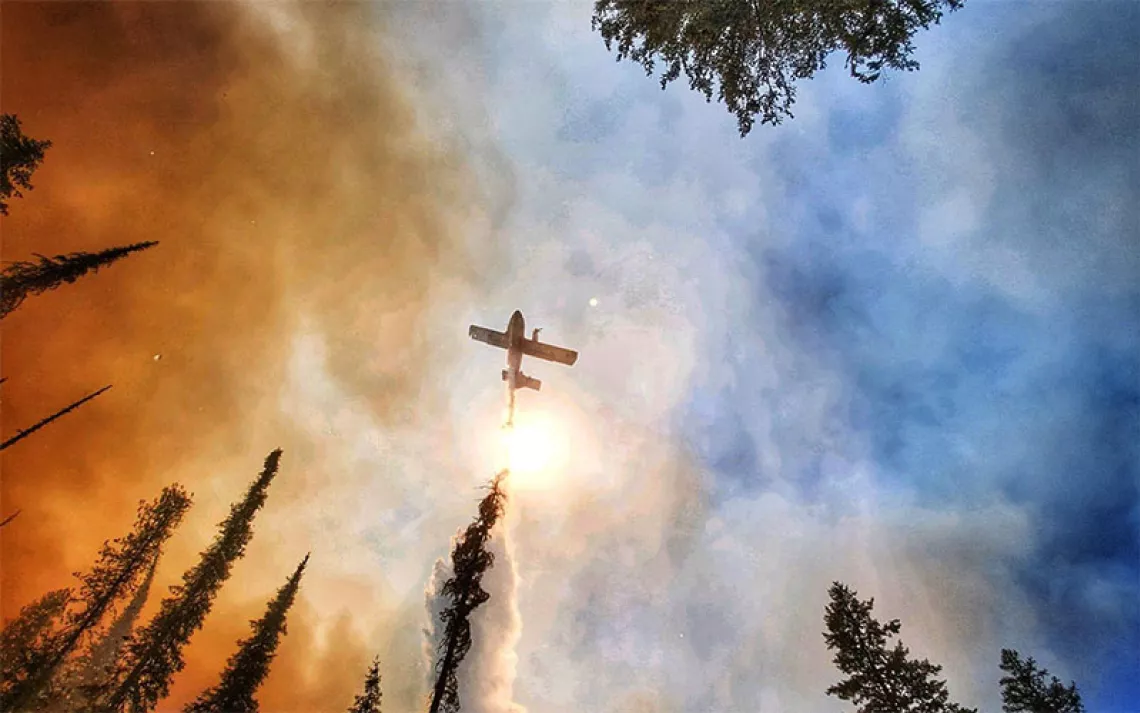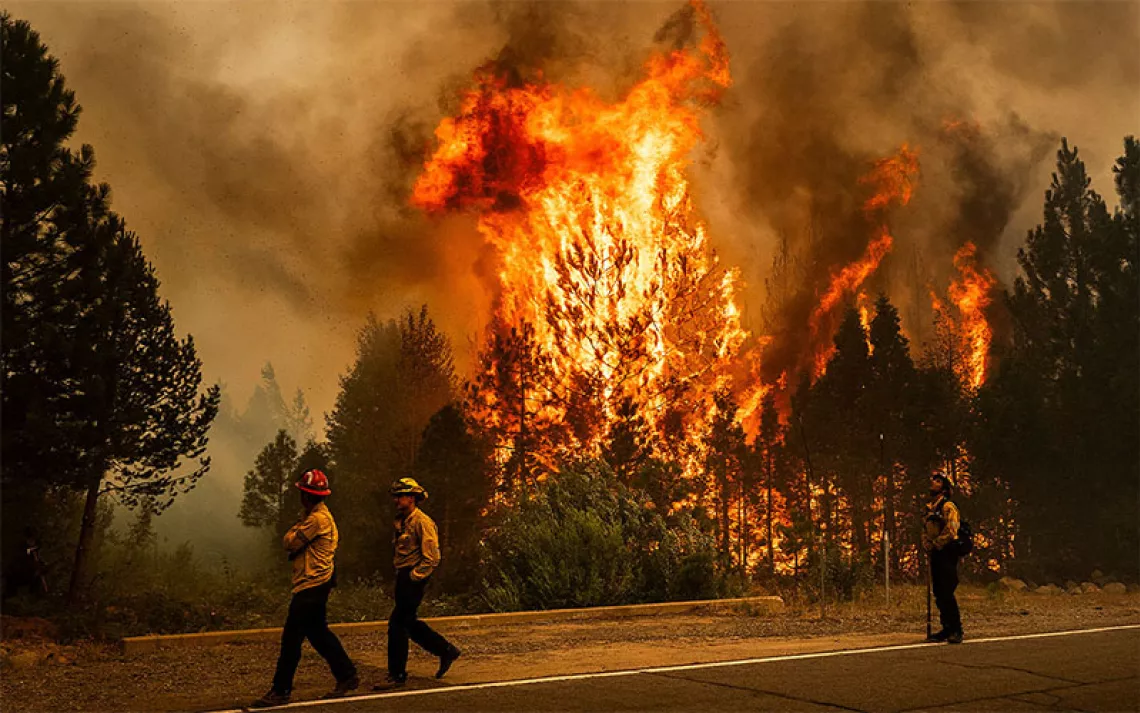Letter From the Oregon Inferno
A writer and volunteer firefighter on the fires consuming the West
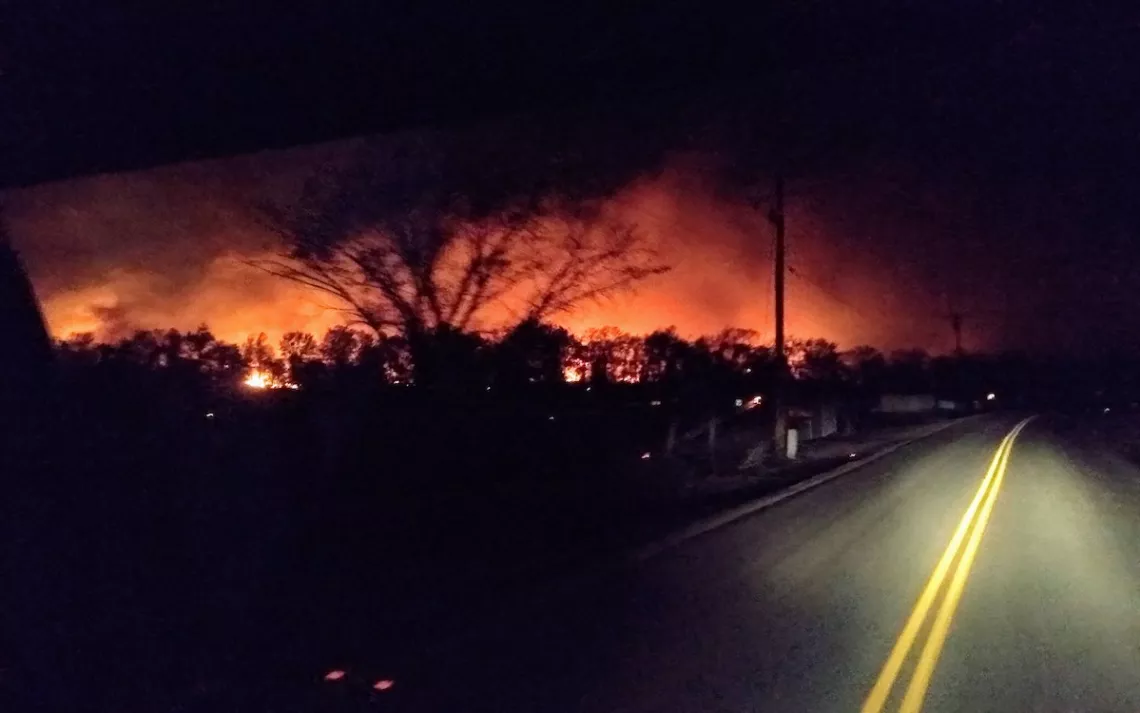
Photo by Juliet Grable
You think, It won’t happen here. You’ve seen the footage of Paradise, or Santa Rosa, or Mendocino, and you think, Oh, those poor people.
But it did happen here. On Tuesday, September 8, the Almeda Fire began tearing through the Rogue Valley in southern Oregon, not far from where my husband and I live. Within 24 hours, whole sections of two towns were obliterated, hundreds of homes were incinerated, and tens of thousands of people were displaced.
The climate crisis is not just knocking on our door. It’s busted through and wreaking havoc.
*
At 11:40 A.M. on September 8, our pagers tone out: Grass Fire. Butler Creek Road, Ashland.
My husband Brint and I are volunteer firefighters for the Greensprings Rural Fire District, 20 miles southeast of Ashland. Occasionally we provide mutual aid on fires outside our district. But why are we being called to a fire that is at least 45 minutes away?
I call our chief, Gene Davies, to make sure.
“Are we rolling?” I ask.
“Yes.” His voice sounds strained, urgent. “Get here. Now.”
The day before, Chief had sent out an alert about a rare wind event that was expected to kick in during the night. Winds were shifting to the east, gusting to 40 miles per hour. The gale, combined with relative humidity in the single digits, make for potentially disastrous fire conditions.
Nine of us head to the fire. Brint and I roll out in our wildland rig. Our water tender and Type I engine follow. On the way, we listen to the scanner. A computerized dispatcher calls out structure fire after structure fire.
We understand two things: This is not just a grass fire, and it’s bad.
We are assigned to an area east of Interstate 5 between Ashland and Talent, a rural residential neighborhood with some small farms and orchards.
Already, houses and barns and vehicles and fields have burned. Many houses stand unscathed but threatened.
Adrenaline slams through me. I try to focus on the tasks at hand: Deploy hose; start the pump. To the northwest, above Talent, billows of smoke metastasize.
Our job is to try to protect the houses that are still standing. At some residences, we close garage doors and any windows that may have been left open. We drag patio furniture away from siding and sweep leaves and debris away from foundations. We drag the hose around a kid’s table and chairs, toys, around potted plants. We spray water on burning fences and blackberry brambles. At one place, we cool down junk piles next to a barn. Two hours later, when we drive by, the barn is gone.
Locals appear from nowhere and follow us around to try to talk to us while we’re working. A woman tells us that all of the houses but one on Ashland Lane have burned. At one corner, a man in shorts and a T-shirt brings us bright-blue Gatorade in plastic red cups and points to the rare Jeeps he lost to the fire.
In between assignments, we take breaks at our staging area at the Comfort Inn. I pull out my phone. News is fragmented, outdated, or nonexistent.
Still at it, I text my friends and stepdaughters. Don’t worry.
At some point between midnight and dawn, our chief shows me a video he took on his phone on a patrol through Talent. I’m shocked. Half the town is gone.

Photo by Juliet Grable
*
The Rogue Valley runs northwest to southeast, cradled by the Cascade Range to the east and the Siskiyou Mountains to the west. A string of towns lie along Bear Creek: Ashland, Talent, Phoenix, Medford. The wind is blowing from the southeast, exactly the wrong direction. The flame front roars up the Bear Creek drainage. Firefighters fall back, ceding entire neighborhoods to the fire.
There’s an irony to the fire’s path. In the past decade, residents have done much ecological restoration work on Bear Creek, removing blackberries and trash and planting native vegetation to cool the creek for salmon. I’ve spotted Chinook redds from the Bear Creek Greenway bridges; I’ve birded at Ashland Pond. Now, that same creek canyon has become a corridor of destruction.
“It’s the whole 13-mile swath,” Rich Tyler of the Oregon State Fire Marshal’s Office tells a reporter for the Redding Record-Searchlight. “The fire started north of Ashland, went up the I-5, Highway 99 corridor and just took out communities, businesses, infrastructure, utilities all the way through Talent, Phoenix, and up to the south end of Medford.”
This was not merely a wildland fire, he stresses. “It was a conflagration of this house burning, which caused more houses to burn, which caused more houses to burn.”
The fire leaves rows of concrete slabs in its wake—the gravestones of people’s homes, stone chimneys like mausoleums. Shadows of ash mark the outlines of former mobile homes. Steel staircases stand alone, rising to nowhere. Engine blocks have melted and pooled beneath the husks of vehicles. In some places, drops of fire retardant have painted red swaths on an otherwise monochromatic landscape.
Oddly, trees next to the incinerated structures are still standing, leaves alive and green.
I’ve seen this before: in photos and video footage of the Camp Fire in California, which destroyed the town of Paradise.
Fire Marshall spokesman Tyler compares the two fires, the wind conditions, the breathtaking speed of destruction. “There are a lot of similarities,” he says. “This would be the Oregon version of [Paradise].”
*
Power poles are down everywhere, their lines splaying onto the street.
Brint, another firefighter named Kyle Miller, and I save a trailer park in Talent. Just beyond the creek and across the road, the fire is consuming houses, clumps of trees, everything. The dull roar of wind and flame is punctuated by the sound of propane tanks exploding.
We try to work upwind, but it’s not always possible. I try not to think about the sweetly noxious odor clinging to us. I’m used to the smoke from wildland fires, which is acrid but recognizable, like an especially intense campfire. The fumes coming off these fires are a toxic brew of vinyl siding and plastic car parts, couches and patio furniture, kids toys and fencing, and BBQs and kitchen appliances. I realize we may be breathing in the cremated remains of people’s pets.
Within hours, my lungs hurt. My hair is as coarse as nylon rope, and my lips are cracked and peeling.

Photo by Tara Borglit
*
Late on Tuesday night, after the fire front raged through Talent, a man named Bow Shaban DeBey pedals his bike along Talent Avenue. On the east side of the street, homes flame and smolder. On the other side, homes are mostly untouched.
Bow shoots video with his phone and narrates as he pedals. He checks addresses for friends who want to know if their houses are still standing.
“The police told me I’m not supposed to be here, but they don’t seem to care,” he says. “It’s so hot. So hot.”
Embers rain down from the air. The wind is still gusting.
“God, there’s the strangest sounds that come out of these houses that are burning,” Bow says.
The street is eerie. An emergency response vehicle speeds by; otherwise, it’s just Bow, his bicycle, and burning houses.
On social media, people are posting, Where are the firefighters?? The comments sting. I know that the men and women working this fire wish they could be everywhere at once, saving every single building. But that isn’t possible. For those of us working the fire, saving property isn’t the priority.
During a press conference, Charles Hanley of Fire District 5 explains: Firefighters are focused on helping people evacuate, not protecting buildings.
“Firefighters are here to fight fire—to put out that grass or put out that structure. When [we] come upon a community that’s ablaze, we don’t get to do the things we usually get to do, which is what the public expects.”
It’s not that our local agencies were caught unaware. In fact, they had used an emergency recall to pull in all available personnel ahead of the wind event. But resources everywhere are stretched to the limit.
I’ve been working on the fire for many hours when Governor Kate Brown declares the Almeda Fire an emergency conflagration, an action that authorizes the Oregon Office of State Fire Marshall to send help.
Only there aren’t any resources left to mobilize. Normally, the fire marshal would send at least 40 personnel to lead the effort fighting a fire like this. Now, they can only send five. Instead of a task force of eight to 10, they send one. There are so many fires in Oregon right now, there are no personnel remaining to deploy.
Shortly after sunrise on September 9, we finally have a decent break. Back at the command post, a few of us lie in the grass next to the lobby entrance. Chief Davies gives us bad news. There’s no one to relieve us. We will have to keep going.
*
People want to help. GoFundMe pages spring up for families who lost their homes. Donations of food, clothes, diapers, and toiletries pile up at churches, the Elks Club, Walmart, the Jackson County Expo Center. Restaurants offer free meals. People make food and bring it to first responders. On Facebook, people post pictures of cats with burned noses and bandaged limbs, lost animals that local vets are treating at no charge.
Households double up, taking in friends and family and even strangers who have lost homes, or who will be without power and water for god knows how long.
Evacuation orders will remain in place for days in parts of Medford, Phoenix, Talent, and Ashland. People are angry that they can’t reach their homes, but there are too many hazards: downed power lines and ruptured gas mains and toxic debris.
Roadblocks keep cars out but not bicycles. A woman pedals through the smoking ruins of neighborhoods, putting out bowls of water and food for any pets that may still be alive. A bicycle brigade forms in Ashland as dozens of cyclists deliver water, food, and other supplies to people who are stranded in their homes in the evacuation zone.
Several of the mobile-home parks that were clustered around Bear Creek are completely destroyed. Many of the homes were not insured. When they burned, the families lost everything. Some are undocumented families who may be too scared to ask for fire assistance.


Photos by Juliet Grable
*
On Thursday, Governor Brown addresses the people of Oregon.
“I think there's no question that the changing climate is exacerbating what we are seeing on the ground," she says. "I think it's incumbent upon all of us to be aware that climate change is going to impact how we live, our economy, our culture and that we all need to be making changes accordingly. It is going to continue to challenge Oregon, the country, and the world."
Brown vows to sign executive orders that will reduce carbon emissions, joining Washington governor Jay Inslee and California governor Gavin Newsom in a West Coast bloc sounding the alarm for climate action.
But Oregon is hopelessly fractured politically, with urban progressives pitted against rural conservatives. People think of Oregon as a blue state, but it’s not really. In southern Oregon, Ashland is a little island of blue in a red county. The urban centers of Portland, Salem, and Eugene have the numbers. The vast rural counties resent it and don’t feel represented in the state capital.
In February, Republican state senators walked out of the legislative session to avoid voting on a cap-and-trade bill that would have established step-by-step caps on CO2 emissions and required certain economic sectors to purchase emissions allowances. Democrats accused their colleagues of abandoning their duties as elected officials; Republicans claimed they had no choice, that Democrats have ignored the concerns of their mostly rural constituents.
The political divide is reflected in rumors about the fires. Right-wingers accuse black-clad Antifa of touching off fires across the state. A post, made to look like an official notice from the Medford Police Department, goes viral. The heading under the mugshot reads, "Five Proud Boys Arrested for Arson." Medford PD reposts the notice, adding FALSE in big block letters across the mugshot. Local officials beg residents to stop spreading misinformation. The Portland FBI issues a statement:
Reports that extremists are setting wildfires in Oregon are untrue. . . . Conspiracy theories and misinformation take valuable resources away [from] local fire and police agencies working around the clock to bring these fires under control.
A man named Michael Jarrod Bakkela is arrested in Phoenix for deliberately setting a fire behind a house. This fire merged with the fire that originated in north Ashland. Bakkela is charged with multiple counts of criminal mischief and reckless endangerment. Bakkela is neither a Proud Boy nor Antifa. His record includes many previous felony convictions related to methamphetamine possession.
*
It’s mid-afternoon on Wednesday before the Greensprings volunteer crew is finally relieved. We still have to drive the rigs back up the hill and make sure they are topped off with water and gas. Brint tells me I look like Alice Cooper, with my red-rimmed, soot-mascara’d eyes. But we get to take baths and sleep in our own beds. Many others aren’t so lucky.
Everyone wants to know: How many homes lost? How many acres burned? How many people displaced? At first, it’s chaos. No one knows anything.
Eventually, numbers start to trickle in. Fifty people missing. Six hundred homes lost in Talent. One thousand buildings in Phoenix. Eighty percent of Phoenix’s elementary-school children are now homeless; in Talent, it’s 50 percent. School was supposed to start on Monday.
My friends are doing a tally of the mobile-home parks. They are concerned that fire destroyed or damaged the majority of the 1,700-plus mobile homes and RVs within the fire footprint.
I check Inciweb, the interagency map of fires. It’s clotted with icons. In Oregon, at least 15 major fires are burning. Over a million acres are on fire. More than 40,000 people have been evacuated. Some half a million people—10 percent of Oregon’s population—are under an evacuation order or warning.
I text my friend Shirley, who is evacuated from the Obenchain Fire. She and her husband and llamas and dog are camped at the Jackson County Expo. Smoke bad but have N95s as of this morning, she texts back. Shirley’s husband has a medical condition, so they are extra careful about COVID-19.
I think about all the people crowded into the Expo, all of the people sheltering with friends and acquaintances, all the people exchanging food and clothing and supplies. Will we see a dramatic spike in COVID cases in the coming weeks?
At least more people are wearing masks now. Air quality began deteriorating as soon as the wind died down. By Friday, a thick orange pall descends on the valley. The Air Quality Index spikes to 400, 500, and beyond. Anything above 300 is considered hazardous. People are urged to stay inside, but many are without electricity and can’t filter the air.
Ugh, worst ever, my friend Dale posts on Facebook, when the index climbs to 519 in Ashland.
Get out!, another friend urges.
But there’s nowhere to go. The entire West is burning.

Photo by Tara Borglit
*
I follow my US senators on Facebook, where I see that Senator Jeff Merkley is visiting the Rogue Valley and posts a short video tour of the devastation.
“We will rebuild. We will recover,” he writes. “And we must act to curb the climate chaos that is fueling these historic disasters. Please know that I will continue to fight for resources immediately, and for bold change in the future.”
There are hundreds of comments. People have dug into their usual ideological positions. While progressives applaud Merkley’s vow and urge him to champion the Green New Deal, rightists scoff at the notion that climate change has anything to do with the fires sweeping across Oregon. They lay blame at the feet of “Dems” and environmentalists who halted logging and grazing on federal and state lands.
PLEASE REFRAIN from using the personal tragedy of others as a political Soap Box for the PHONY Scam . . . climate change.
Just a reminder that the entire Oregon Republican State representatives left the state, rather than be forced to vote on a Wild fire lands preparedness bill presented by Governor Brown. Remember their hypocrisy.
Blue got us into this mess. Vote red.
The acrimony on both sides leaves a taste in my mouth more bitter than the smoke.
*
There is a sense that this fire will be a permanent marker for Oregon, that everything before and after will hinge on this horrible event.
The word unprecedented keeps coming up.
An editorial in the Medford Mail Tribune quotes Doug Grafe, the Oregon Department of Forestry’s chief of fire protection, who called the combination of high winds, dry fuels and heat “the worst fire conditions in state history.” The editors warn that recovering from this unprecedented disaster will require “massive federal assistance” and “a great deal of time.”
In a press conference, fire chiefs warn that the process of rebuilding could take years. Chief Hanley urges people to pull together.
“We will work in every way to prevent or mitigate these kinds of events from occurring,” he says. “It’s no longer something you see on YouTube or TV. The only way we’re going to fix this is by working together.”
I try to reconcile this message of cooperation and solidarity with the vitriol over climate change. It’s just a few Facebook users, I tell myself. It’s not representative of how we are, of who we are.
As I watch the recorded press conference, I receive a Citizen Alert notification. All of Jackson County has been placed on Level 1/Get Ready evacuation notice because of red flag weather conditions. Strong, gusty winds are expected out of the southwest.
If we can get past these days, the weather is supposed to shift. A cold front. There is even a chance of rain.
At this point, all we can do is pray.
 The Magazine of The Sierra Club
The Magazine of The Sierra Club
